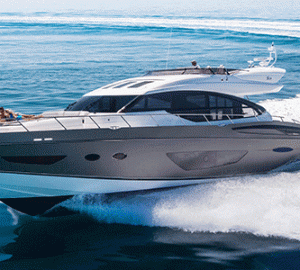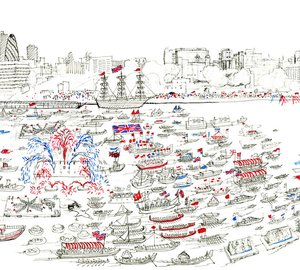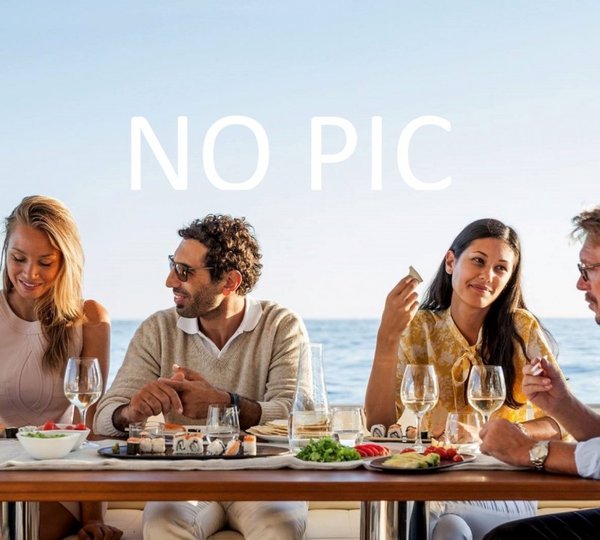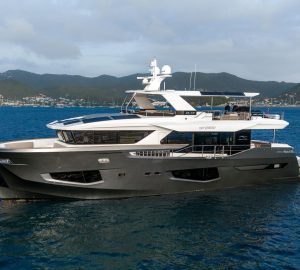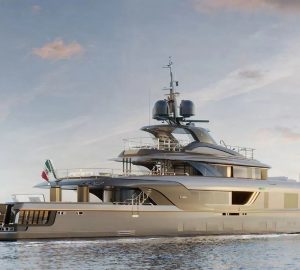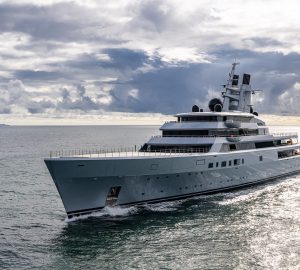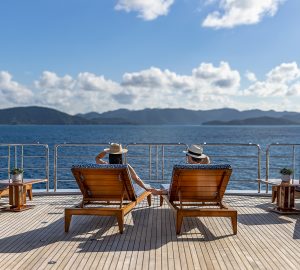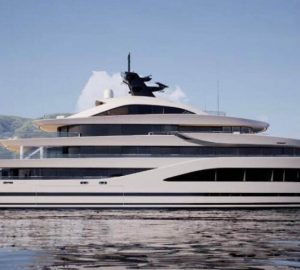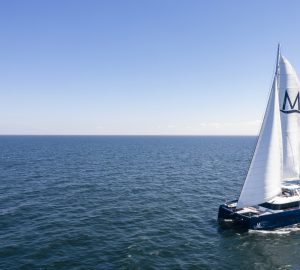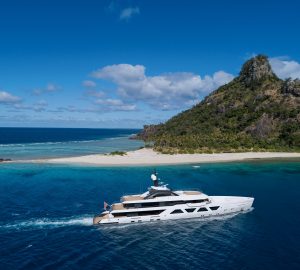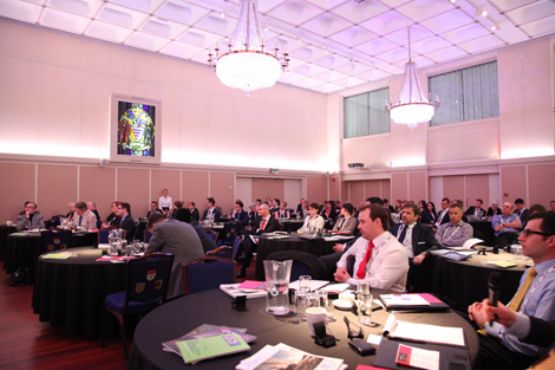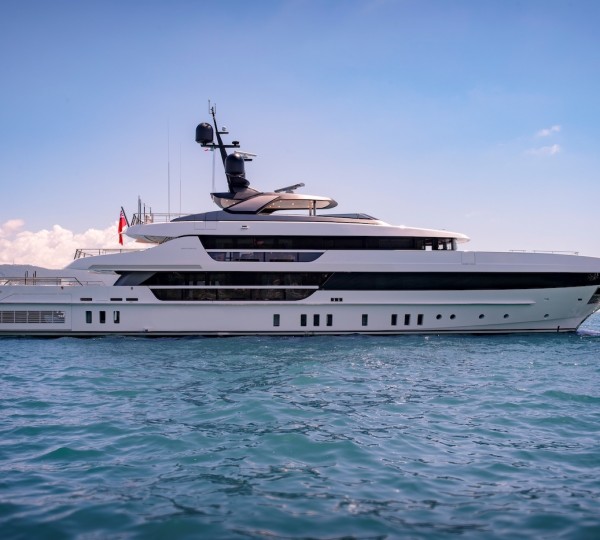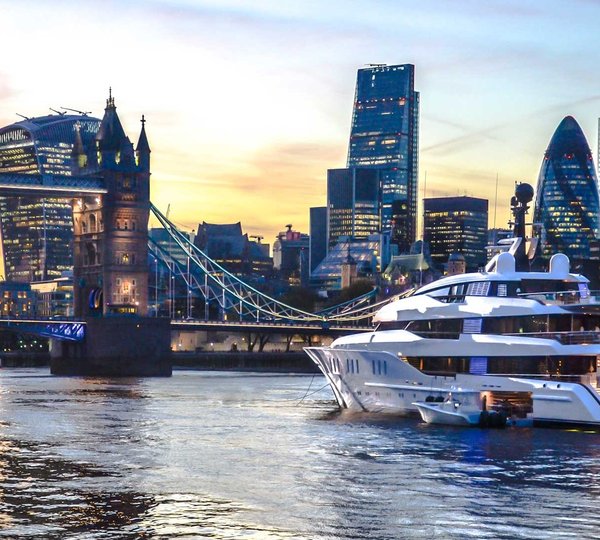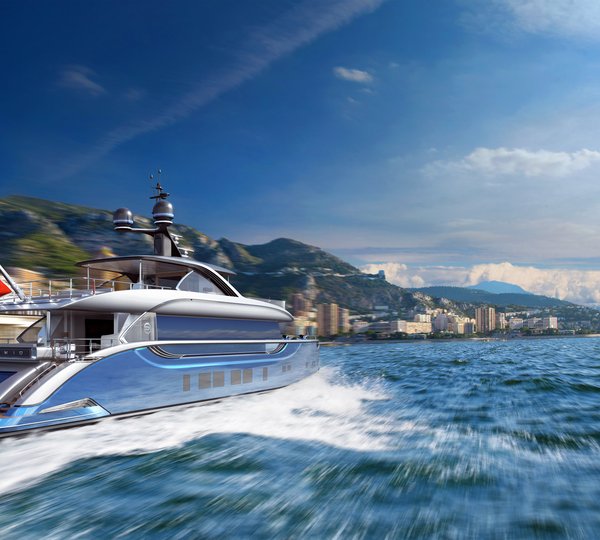The 2012 Superyacht Fiscal Summit, taking place at London’s Glaziers Hall, got underway with a keynote address from The Superyacht Group’s Chairman Martin H Redmayne, who was joined on stage by Floating Life’s general manager Andrea Pezzini as well as Chairman Barbara Tambani. The trio spoke about the driver for all fiscal matters – the superyacht owner.
Redmayne opened by outlining the key aim that all corporate and fiscal service providers should grasp – the retention of owners in yachting. This is achievable he said, through the conveyance of clear, honest and consistent information and advice, the lack of which, Pezzini said, is a major problem facing the superyacht industry in 2012.
Tambani identified the regulatory minefield that comes with cruising European waters as a further source of discouragement for owners, many of whom are opting to build their vessel for private use to “avoid the headache”. Redmayne agreed, predicting that this trend could be reflected by a quieter summer season for the Mediterranean this year.
As Pezzini said, the fundamental way of retaining a broad base of clients, and expanding the number of clients who want to own superyachts is “to change our mentality.” “It’s our problem not theirs. They don’t want to have to learn about every change in tax legislation; they want the best advice,” he added.
Pezzini then went on to explain that there will be monetary issues and challenges wherever a commercial vessel chooses to cruise – the only safe place being “in the middle of the sea” – and it is the job of a well run management company to overcome these challenges by being well informed and well organised. He cited one example of a client whose captain was left to discuss discrepancies with the local port authority for 48 hours, by which time all manner of unnecessary information on the owner and his family had been leaked. This sort of scenario must be avoided.
The floor was then opened to questions, with Quentin Bargate and Adrian Jones saying that, on the whole, there are a lot of very good practices, a point that Tambani expanded upon, saying, “it’s about dealing with people who are honest, and don’t just say ‘yes’.”
Both Alex McBarnet and Carlo Galli then said that owners needed to be aware from the start that they would have to pay tax on transactions. Once that was negotiated they said, the service providers could work towards more achievable exceptions and caveats, on the assumption that owners understood what was expected of them. This led Redmayne to close the session by returning to a recurrent theme: our role as an industry is to realistically manage the expectations of owners and we do this by performing our duties well and asking the right questions.
The day continued with the very aptly titled ‘Taxing Times” session in which the complex but highly contemporary subject of tax laws in Europe, with France, Italy and Spain the main focus, was broached. The panel comprised Patricia Bullock, director of Altius Yacht Services, speaking on behalf of the Spanish situation, Thierry Voisin, ex MYBA president who shed light on France and Carlo Galli head of the Italian tax department at Clifford Chance. Joining these country representatives were Freddy Desplanques at Ince & Co and Adrian Jones, Director of VAT at Blackstar.
Bullock started the session off with an update on the matriculation tax in Spain, which has proved somewhat crippling to the prosperity of its yachting industry. The tax as it stands requires all yachts with a Spanish flag and, most contentiously, all yachts over 15m chartering in Spanish waters to pay a 12% matriculation tax. Bullock has called on the government to “get rid of the 15m limit” and simply say “no matriculation tax on charter vessels.” It is hoped the government will include this new legislation in the 2012 Budget, being formalised in the next few days. Bolstering hopes is the fact of the new right leaning government. “A socialist government can’t be seen to eliminate tax” for the rich said Bullock, adding that the current government had been “totally in agreement” with illogical fact of the calculated 600 million euro loss to Spain through the tax on charter.
The alarming measures imposed by the Spanish tax authorities continued with revelations on how yachts are valued in order to calculate the amount paid in tax ( 12% of the yacht’s value for matriculation and 18% of its value for VAT). Authorities are reportedly browsing brokers websites to calculate this value where prices are notorioulsy highly inflated and not a reflection of their true value. Bullock said “we are disputing this and it will be taken to the Supreme Court.”
Moving onto the tax situation in France, Voisin prefaced his thoughts by saying, “We have a unique situation in France, we have people who are in favour of yachts.” Voisin’s talk hinged on the limbo that france is in, having flouted the EU directive to impose VAT on all commercial vessels in French waters, exempting yachts in the high seas. Currently, France is waiting for the verdict to be delivered early next year – until then it is operating as per normal at the 0% VAT rate. It was urged that the French tax authority should “write a letter” to explain the situation to superyacht owners. However Voisin said this was unlikely because a French authority that wants to remain popular with the industry “doesn’t want to cause [them] difficulties.”
In Italy, where the recent tax on yacht owners in Italian waters has just been repealed to target Italian yacht owners only, Galli said crunch time had come. “Filthy rich having fun should pay taxes” is the approach in Italy now, adding “we have a more VAT able system coming on.” Galli said that new aspects of VAT included a rise in to 21- 23% by the end of the year and more scrutiny on charter vessels. The latter would result in “no questions asked” for commercial operations where more than 50% of the profits went to non shareholders, but any less than this figure would require proof of charter – “proof is key”, Galli concluded.
Other tax issues affecting the Mediterranean generally were broached by Desplanques and Jones. The temporary Admission Regime (TA) was a hotly debated subject, which in broad terms means any yacht can stay for 18 months maximum in the Med at a reduced VAT rate. There were problems cited by Jones in proving a yacht has been in the Med for this time limit, with no formal paperwork system in operation and citing instances of having to trek back to marinas or countries visited to gain the necessary proof. Jones said that in Holland there were no loopholes to be found, such as going out of EU waters to Algerian Ports (an example found by Bullock) and back again to re set the 18-month clock. Jones added that the TA law is the same across all 27-member states but with “different interpretations.”
Whether charter yachts could be classed as for passenger transport and thereby have more favourable VAT benefit was another subject discussed, but with no easy solutions.
The session was summed up neatly by Jones, “The yacht industry is not a cottage industry as it once was. It’s got bigger. The law needs to grow up, to catch up with where the industry is now.” Growth and improvement is never a smooth process so it is no wonder yacht tax in Europe is a minefield and rather messy even at the very top of the legal and judicial processes. The industry is indeed in the midst of very taxing, but not boring (if this can ever be said of tax) times.
The day concluded with a broad and candid discussions of all matters fiscal, entitled, ‘A Question of Money Matters’. Paddy Behan of Behan & Co., opened the discussion with a retrospective look at some of the most pertinent tax issues raised in the previous session. He said that, contrary to popular opinion, “sometimes [an owner] wants what they didn’t think they’d want – VAT registration in a benign country, which can practically bypass all HMRC ‘anti-avoidance zones.’”
Behan said that, in a “science fiction mode”, an ‘Authorised Economic Operator’ voluntary system of tax compliance that could be carried on board and presented on demand. Adrian Jones concurred from the audience, saying that it could be a good tool for furthering the collective cause of the industry, although the prospects of popular uptake were slim.
The talk then turned to banking, with Bob Atkinson of Barclays Wealth, the industry’s biggest institutional lender acknowledging that banks had had to “hugely” readjust their targets. Now, unfortunately, it is not the clients who need finance who will secure loans, but those who can present a healthy portfolio, diverse assets and a longstanding banking relationship. In short, today banks follow “more cautious lending schemes”.
Redmayne asked what had happened to the toxic loans that have accrued during the bleak years. Atkinson said that they are still covertly marketed and have been substantially written down, although they will not be disposed of and there have been audacious offers to buy entire books of ‘distressed’ vessels. CRS Insurance’s Simon Ballard thought that this was a superb opportunity for those prepared to take the plunge. Shipyards too must demonstrate greater transparency and a more secure business model in order to secure a loan. As Atkinson said, “that’s never an easy conversation!”
He concluded, “the asset is what it is and the scrutiny remains on the client. If they don’t play ball and bring other business to the table, then sorry, it’s a no. And unfortunately it’s not those who need it that are driving the industry.”
For insurance, Ballard conceded it had been a “very drastic year”, and the worst ever for the wider insurance industry. With the high profile sinkings of Costa Concordia and Yogi, premiums are set to rise somewhat, although an overcrowded underwriter’s market and a larger fleet means that premiums remain lower than insurers would like. The risk has undoubtedly risen in the eyes of underwriters but yachts are still seen as safer to cover than commercial vessels. In the case of Yogi, he predicted the process of paying out would be a protracted one, and could take as long as six months, with the investigation’s stalled conclusion delaying the process.
The talk turned back to the need to manage owners’ expectations and ask the telling questions that exposed the best service provisions. Ballard cited a genuine case where a client opted for a cheaper premium that turned out not to offer machinery failure cover. “This problem has always been there but it seems to be getting worse [in light of the recession],” he added. Ince & Co’s Albert Levy said that, from a lawyer’s perspective it would be negligent to recommend insurance services without the relevant knowledge, and this ideology should pervade the industry.
Rob Tobin, of Dohle Private Clients, neatly rounded off the session with the management perspective. “It’s a relationship industry,” he said, “but that often leads to poor purchasing practice.” Broadly speaking he said, he was happy with the state of yacht management and highlighted the “well resourced” business models of the ‘big five’ as blueprints for other management companies. However, for smaller service providers he said too many were “good administrators dressed up as yacht managers”, and that they should place a greater emphasis on recruiting taskmasters.
The Superyacht Fiscal Summit concluded with Redmayne calling on superyacht professionals to balance the cost of enjoying a yacht by providing value for money. We as an industry need owners to stay in the market and must not question their expenditure because it has not afforded them value.
“We have a huge a potential client base and a healthy future if we can get owners to tell their friends about how enjoyable yacht ownership is. We must protect that process or our client base will decrease.
“Empty promises from service providers are biting us. We need to grow up; the cream of the industry, who attend these conferences, must work together and build a better industry.”

